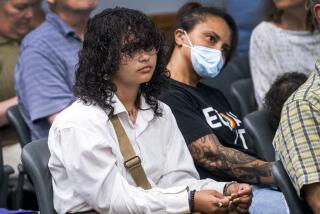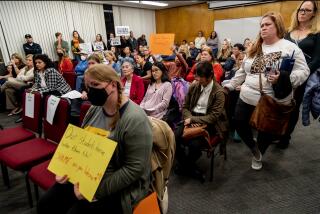Task Force’s Guidelines on AIDS Sent to College Board : Health: Plans call for each campus to devise educational programs that might deal with ‘abstinence, condoms, etc.’
- Share via
Ventura County community college trustees next week will consider a new set of district AIDS guidelines that leaves many controversial decisions on condom distribution and educational policy to the individual colleges.
After wrangling since August over wording and philosophical intent, the district’s AIDS task force came up with guidelines last month that call for “wellness committees” at each of the three campuses to devise their own programs for educating students about AIDS.
Each educational campaign, the guidelines state, “may include the consideration of such issues as abstinence, healthy behaviors, safer sex practices, condoms, etc.”
Moorpark College already has a wellness committee whose first event was putting on the AIDS Awareness Week this fall.
The 18-member task force was composed of district staff, faculty, administrators and students, as well as members of the community.
One task force member, Darlene Pacheco, also Moorpark College’s vice president of instruction, said she was pleased overall with the committee’s product. “It’s a workable document,” she said.
She added, however, that she would have been more decisive on some issues--such as condom distribution--that have created controversy.
“I would have preferred that we come right out and make (condoms) more available,” she said. “I wouldn’t have pussyfooted around with that. Now, the (wellness) committees are going to have to grapple with that, and somebody’s going to have to make a decision.”
College district Trustee Allan Jacobs said he will support the new guidelines when trustees consider them on Tuesday. He said he wanted to know, however, why the guidelines say that the educational campaigns “may” include consideration of such issues as abstinence and condoms.
“Why do they say may rather than should ?” he asked. “I think all these things need to be discussed, myself.”
*
The district board’s other trustees could not be reached for comment.
Other task force members said they were comfortable with the new guidelines precisely because they would allow the campuses such flexibility.
“We want each college to have the ability to meet their individual needs, because the demographics are different at each school,” said Caesar Julian, a family practitioner in Simi Valley who was asked by Jacobs to sit on the task force.
Barbara Buttner, a district spokeswoman and representative of the board and chancellor on the task force, said the group’s meetings were marked by often spirited debate.
“You have a diverse group of people, each one with their own set of values, and then you put them in a room with something as volatile as AIDS to talk about and you are bound to have, uh, exciting conversations,” she said.
One of the most controversial issues was whether the district should promote abstinence as the sole means of protection against the virus that causes acquired immune deficiency syndrome, she said. In the end, it was listed as one of a number of AIDS-related issues the campuses might discuss.
*
The AIDS task force has a convoluted history that dates back to the winter of 1991. At that time, it was called the District Wellness Committee, and it was instructed by the district board to develop an AIDS policy for the three campuses and the district office. Some trustees were uncomfortable with the existing policy, adopted in 1988, that explicitly endorsed condom dispensing machines in college restrooms.
When the committee presented its proposed policy to the board in May, 1992, students objected because the committee had no student representation.
So the board set aside that document and in November, 1992, formed the present AIDS task force. In August, the board approved the task force’s AIDS policy, which sets broad goals for the district on AIDS issues and does not include specific mention of condoms or how they might be dispensed on the campuses.
Buttner said the year she spent on the task force proved to be an important learning experience.
“We’ve learned how to appreciate other people’s lifestyles and be tolerant,” she said. “We’ve all grown as individuals, I think.”
More to Read
Sign up for Essential California
The most important California stories and recommendations in your inbox every morning.
You may occasionally receive promotional content from the Los Angeles Times.










